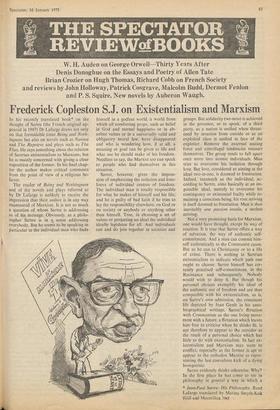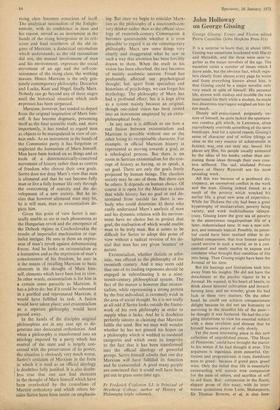THE SPECTATOR
wre MEVIEWaBOOKS
W. H. Auden on George Orwell—Thirty Years After Denis Donoghue on the Essays and Poetry of Allen Tate Brian Crozier on Hugh Thomas, Richard Cobb on French Society and reviews by John Holloway, Patrick Cosgrave, Malcolth Budd, Dermot Fenlon and P. S. Squire. New novels by Auberon Waugh.
Frederick Copleston S.J. on Existentialism and Marxism
In his recently translated book* on the thought of Sartre (the French original ap- peared in 1967) Dr Lafarge draws not only on that formidable tome Being and Noth- ingness but also on novels such as Nausea and The Reprieve and plays such as The Flies. He says something about the relation of Sartrian existentialism to Marxism; but he is mainly concerned with giving a clear exposition of the former. In his final chap- ter the author makes critical comments from the point of view of a religious be- liever.
The reader of Being and Nothingness and of the novels and plays referred to by Dr Lafarge is unlikely to receive the impression that their author is in any way enamoured of Marxism. It is not so much a question of whom Sartre is addressing as of his message. Obviously, as a philo- sopher Sartre is in a sense addressing everybody. But he seems to be speaking in particular to the individual man who finds himself in a godless world, a world from which all comforting props, such as belief in God and eternal happiness or in ab- solute values or in a universally valid and obligatory moral law, have disappeared and who is wondering how, if at all, a meaning or goal can be given to life and what use he should make of his freedom. Needless to say, the Marxist too can speak to people who find themselves in this situation.
Sartre, however, gives the impres- sion of emphasising the isolation and lone- liness of individual centres of freedom. The individual man is totally responsible for what he makes of himself and his life; and he is guilty of bad faith if he tries to lay the responsibility elsewhere. on God or on society or anybody or anything other than himself. True, in choosing a set of values or projecting an ideal the individual ideally legislates for all. And individuals can and do join together in societies and groups. But solidarity (we-ness) is achieved in the presence, so to speak, of a third party, as a nation is unified when threat- ened by invasion from outside or as an exploited class is unified in face of the exploiter. Remove the external uniting force and centrifugal tendencies reassert themselves. The group tends to fall apart once more into atomic individuals. Man tries to overcome his isolation through love. But love, considered as aiming at the ideal two-in-one, is doomed to frustration. Indeed, inasmuch as the individual, ac- cording to Sartre. aims basically at an im- possible ideal, namely to overcome his contingency or existential frailty while re- maining a conscious being. his root striving is itself doomed to frustration. Man is thus inevitably une passion- inutile, a useless striving.
Not a very promising basis for Marxism, one would have thought. except by way of reaction. It is true that Sartre offers a way of salvation, the way of authentic self- commitment. And a man can commit him- self authentically to the Communist cause. But so he can to Christianity or to a life of crime. There is nothing in Sartrian existentialism to indicate which path one ought to choose. Sartre himself has cer- tainly practised self-commitment, in the Resistance and subsequently. Nobody would wish to deny it. But though his personal choices exemplify his ideal of the authentic use of freedom and are thus compatible with his existentialism, so is, on Sartre's own admission, the consistent life depicted by Jean Genet in his auto- biographical writings. Sartre's flirtation with Communism as the one living move- ment with a future. a flirtation which leaves him free to criticise when he thinks fit, is apt therefore to appear to the outsider as the result of a personal choice which has little to do with existentialism. In fact ex- istentialism and Marxism may seem to conflict, especially as the former is apt to appear to the orthodox Marxist as repre- senting the last convulsive kick of a dying bOurgeoisle.
Sartre evidently thinks otherwise. Why? In the first place he has come to see in philosophy in general a way in which a * Jean-Paul Sartre: His Philosophy. Rene Lafarge translated by Marina Smyth-Kok (Gill and Macmillan 36s) - rising class becomes conscious of itself. The analytical rationalism of the Enlight- enment, with its confidence in man and his reason, served as an instrument in the hands of the rising bdurgeoisie in its crit- icism and final overthrow of the old re- gime of Marxism, a dialectical rationalism which understands, as the old rationalism did not, the mutual involvement of man and his environment, expresses the social movement of an age and the self-con- sciousness of the rising class, the working masses. Hence Marxism is the only gen- uinely contemporary philosophy. Descartes and Locke, Kant and Hegel, finally Marx. Nobody can go beyond any of these stages until the historical situation which each expresses has been surpassed.
Marxism, however, has tended to depart from the original inspiration of Marx him- self. It has become dogmatic, presenting itself as the final scientific truth; and, more importantly, it has tended to regard men as objects to be manipulated in view of cer- tain ends. As an instrument in the hands of the Communist party it has forgotten or neglected the humanism of Marx himself. Men have been looked on as things and as tools of a deterministically-conceived movement of history rather than as centres of freedom who choose their own goals. .Sartre does not deny Marx's view that man is alienated and that he can become fully man or live a fully human life only through the overcoming of scarcity and the de- velopment of a new society. But he in- sists that howevef alienated man may be, he is still man, man as existentialism de- picts him.
Given this point of view Sartre is nat- urally unable to see in such phenomena as the Hungarian revolt and the emergence of the Dubcek regime in Czechoslovakia the results of imperialist machination or cap- italist intrigue. He sees in them an expres- sion of man's revolt against dehumanising forces. And he looks on existentialism as a humanism and as the expression of man's consciousness of his freedom, he sees in it the means of recalling Marxism to basic elements in the thought of Marx him- self, elements which have been lost to view. In other words, existentialism is for him in a certain sense parasitic as Marxism. It has a job to do; but if it could be subsumed in a purified and rejuvenated Marxism, it would have fulfilled its task. A fusion would have taken place; and existentialism as a separate philosophy would have passed away. In the hands of the disciples original philosophies are in any case apt to de- generate into desiccated orthodoxies. And when a philosophy is transformed into an ideology imposed by a party which has control of the state and is largely con- cerned with the preservation of its power, the situation is obviously very much worse.
Sartre's criticism of Marxism in the form in which it is used as an official ideology is doubtless fully justified. It is..also doubt- , less true that one can find elements in the thought of Marx himself which have been overlooked by the custodians of Marxist orthodoxy and which others be- sides Sartre have been intent on emphasis- ing. But once we begin to consider Marx- ism as the philosophy of a nineteenth-cen- tury thinker rather than as the official ideo- logy of twentieth-century Communism it becomes questionable whether it is even plausible to regard it as the contemporary philosophy. Marx saw some things very clearly and exaggerated what he saw in such a way that attention has been forcibly drawn to them. When the truth in his vision has been absorbed, the rest becomes of mainly academic interest. Freud has profoundly affected our psychological thought; but, apart from specialists and historians of psychology, we can forget his mythology. The philosophy of. Marx has had a profound effect; but it is kept alive as a system mainly because an original, though one-sided vision has been turned into an instrument employed by an extra- philosophical body. In any case it is difficult to see how a real fusion between existentialism and Marxism is possible without one or the other losing its recognisable character. For example, in official Marxism history is represented as moving towards a goal, as a teleological process. But • there is no room in, Sartrian existentialism for the con- cept of history as having, so to speak, a set goal. There are only the goals freely projected by human beings. The classless society may be one of them. But there can be others. It depends on human choice. Of course it is open for the Marxist to claim that while history has no goal or end de- termined from outside (as there is no- body who could determine it) those who really understand Marx's analysis of man and his dynamic relation with his environ- ment have no choice but to project that goal, the realisation of which would enable man to be truly man. But it seems to be difficult for Sartre to adopt this point of view without a radical revision of his de- nial that man has any given 'essence' or nature.
Existentialism, whether theistic or athe- _ istic, was offered as the philosophy of the twentieth century. And it may seem odd that one of its leading exponents should be engaged in subordinating it to a nine- teenth-century philosophical system. The fact of the matter is however that existen- tialism, while representing a strong protest by the free individual, is extremely weak in the area of social thought. So it is not really at all odd if Sartre looks outside the frame- work of his own philosophy in order to supply what it lacks. And he is doubtless perfectly sincere in claiming that Marxism fulfils the need. But we may well wonder whether he has not pinned his hopes on a philosophy which is wedded to outdated categories and which owes its longevity to the fact that it has been transformed into the official ideology of powerful groups. Sartre himself admits that one day Marxism will have fulfilled its function and be transcended. A good many people are convinced that it could well have been put out to grass some time ago.
Fr Frederick Copleston S.J. is Principal of Heythrop College; author of History of Philosophy (eight volumes).











































 Previous page
Previous page